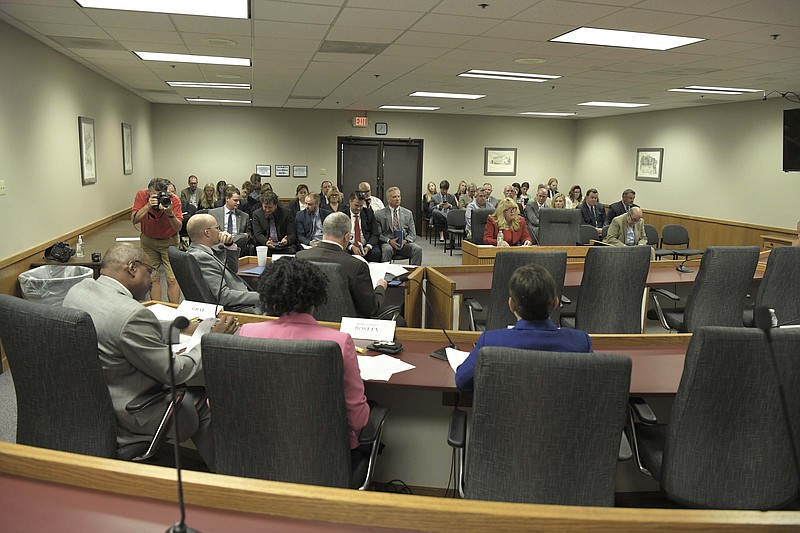During a brief hearing Tuesday afternoon, the Missouri House of Representatives' Ways and Means Committee handed up a bill that would pave the way for people to receive tax credit for multiple vehicles they sell when they purchase another vehicle.
House Bill 1 is the only bill lawmakers will consider during today's extraordinary session that Gov. Mike Parson convened in August.
Despite the long odds that they could convince Parson to expand the special session to include legislation aimed at reducing firearms violence across the state, Democratic lawmakers filed nine bills and a joint resolution Monday they said include pieces to the puzzle necessary to curb gun violence. They filed at least eight more firearms bills and another resolution Tuesday.
State law allows the governor to convene the General Assembly in special session for a maximum of 60 calendar days at any given time, according to the Missouri House of Representatives website. When a governor does so, only subjects recommended by the officeholder when calling for the session - or a special message - may be considered.
However, the governor may choose to add other subjects to the session.
Democrats have called on Parson to do just that - and address firearms violence or scrutinize the drop in Missouri's Medicaid rolls. Parson has declined, according to House Minority Leader Crystal Quade, D-Springfield.
Gun violence is a concern throughout the state, Quade said. A teenage girl was fatally shot while sitting on her front porch Aug. 24 in Cape Girardeau, for example.
"This is the very definition of an extraordinary occasion that would merit a special legislative session," Quade said during a news conference in the House Lounge following the committee meeting Tuesday afternoon. "Unfortunately, the governor has dismissively said the special session is not the correct avenue for saving lives by enacting common sense gun reform."
As lawmakers arrived in Jefferson City for the special session Monday, House Democrats filed the first wave of bills - asking lawmakers to consider a number of steps aimed at reducing gun violence.
State Rep. Alan Green, D-St. Louis, sponsored House bills 2, 3 and 4.
HB 2 would make it a crime to sell, lease, loan or give an assault weapon to a person younger than 21, except for the delivery of a weapon to a peace officer performing their duty.
HB 3 (and House Bill 5) would establish "Extreme Risk Protection" and make it a crime to possess a firearm while subject to an extreme risk protection order (extreme risk orders empower families, household members or law enforcement - through the courts - to temporarily remove a person's access to firearms).
HB 4 would require the Department of Public Safety to study gun violence and appoint a committee to oversee the study's results.
House Bill 6 could create the offense of unlawfully storing and securing a firearm in the presence of a child. The offense is committed if a child discharges a firearm, resulting in injury or death.
House Bill 7 would require a licensed firearms dealer to conduct background checks on all sales or transfers of ammunition. It also would require that the dealer process all sales or transfers.
Other bills would set up firearm registries, make it a felony to possess an assault weapon, and penalize dealers for selling high-capacity magazines or civilians for possessing them.
Calling a special session to allow a few people to avoid paying their full share of taxes can't be defended, Quade said.
However, without the governor's consent, only HB 1 received a hearing.
During Tuesday's hearing, nobody testified against the bill.
Parson called the extraordinary session to respond to the state Supreme Court's decision on a legal fight over taxes paid by a St. Louis County resident. David Kehlenbrink sold two vehicles - a Ford truck and a Kawasaki motorcycle - and later bought a new Dodge pickup. He received sales tax credit on the two previously sold vehicles.
Later Kehlenbrink sold two more vehicles, but was told he could not take tax credit on them (to reduce the sales taxes he paid on the Dodge).
He went to court, and the case went to the Supreme Court, which said he could only take the sales tax credit on one vehicle.
HB 1 sponsor Becky Ruth, R-Festus, told hearing listeners Tuesday that the state Department of Revenue has a regulation that has been on the books since 2006.
"That regulation that DOR has, has stated clearly that they've been allowing multiple vehicle trade-ins," Ruth said.
Although DOR has a regulation on the books, its application has been inconsistent, Ruth said.
"If a person purchases or contracts to purchase a motor vehicle or trailer and sells one or more motor vehicles or trailers within 180 days before or after the purchase or contract to purchase, the person owes tax on the difference between the purchase price and the sale price of the respective motor vehicles or trailers," she read while emphasizing the plural forms of the nouns. "If the person paid the full amount of the tax on the purchase, the person may obtain a refund of the excess tax paid."
Doug Smith, chief executive officer of the Missouri Automobile Dealers Association, said the issue is obviously important to his industry.
"What this bill would do is give clarity to the consumer," Smith said. "What's happened with the recent decisions from the Supreme Court - it throws out a decade and half of implied state policy."
Clarifying the law in statute takes all the gray area away and takes "guess work" out of the tax credits, he said.
People he'd spoken to said the consumers who trade in multiple vehicles are typically small business owners.
"It's the HVAC guy that's got a couple of vans that he's ready to turn in for a new one. It's the contractor that's got the (heavy-duty) trucks that he's turning in," Smith said. "Probably consumers as well."
The bill passed out of the committee on a 6-4 vote.

